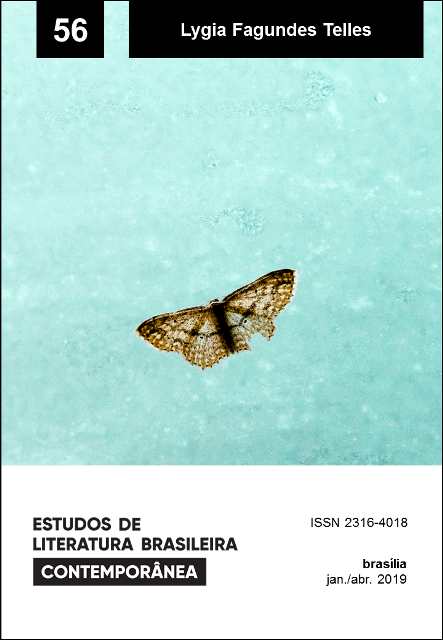Undressing the narrative: a feline poetics (points about alterity)
DOI:
https://doi.org/10.1590/2316-4018565Keywords:
animal, human, frontier, alterityAbstract
With the advent of Cultural Studies, the interdisciplinarity between sciences has raised new questions about the boundaries between mankind and animals. The resulting field of Animal Studies has permeated the works of writers such as Jacques Derrida and J.M. Coetzee (writings about the animal), Michael Foucault (madness and animalism), Deleuze and Guattari (the concept of becoming animal), Peter Singer and Giorgio Agamben (bioethical approaches), Eduardo Viveiros de Castro (ethnological studies), and Maria Ester Maciel (zoopoetics) among others. These studies are justified not only because of growing concerns of ecological order but also because of a certain interest in our relationship to other species, because of a kind of human crisis which has provoked a number of discussions among researchers. In studying the novel As horas nuas by Lygia Fagundes Telles, we try to locate the construction of the boundaries between humans and animals, through a theoretical framework of Animal Studies. This article aims to present a discussion about the spaces reserved for those absolutely other in our society.
Downloads
References
BATAILLE, Georges (1993). Teoria da religião. Tradução de Sergio Goes de Paula e Viviane de Lamare. São Paulo: Ática.
CASTRO, Eduardo Viveiros de (2008). Eduardo Viveiro de Castro. Coleção Encontros. Rio de Janeiro: Bico do Azougue.
COETZEE, J. M. (2002). A vida dos animais. Tradução de José Rubens Siqueira. São Paulo: Companhia das Letras.
COMPAGNON, Antoine (2001). O demônio da teoria: literatura e senso comum. Tradução de Cleonice Paes Barreto Mourão e Consuelo Fortes Santiago. Belo Horizonte: Editora da UFMG.
DELEUZE, Gilles; GUATTARI, Félix (2012). Mil platôs: capitalismo e esquizofrenia, v. 4. 2. ed. Tradução de Suely Rolnik. São Paulo: Ed. 34.
DELEUZE, Gilles; PARNET, Claire (1998). Diálogos. Tradução de Eloisa Araújo Ribeiro. São Paulo: Escuta.
DERRIDA, Jacques (2001). Posições/Jacques Derrida. Tradução de Tomaz Tadeu da Silva. Belo Horizonte: Autêntica.
DERRIDA, Jacques (2002). O animal que logo sou. Tradução de Fábio Landa. São Paulo: Unesp.
DIMAS, Antonio (2009). Garras de veludo. In: TELLES, Lygia Fagundes. Antes do baile verde. São Paulo: Companhia das Letras, p. 181-196.
FOUCAULT, Michel (2010a). História da loucura. Tradução de José Teixeira Coelho Neto. São Paulo: Perspectiva.
FOUCAULT, Michel (2010b). O corpo utópico. Página/12, Buenos Aires, p. 10, 29 out.
FREUD, Sigmund (1990a). Totem e tabu. In: FREUD, Sigmund. Edição standard brasileira das obras psicológicas completas de Sigmund Freud. Rio de Janeiro: Imago. v. 13. p. 11-125
FREUD, Sigmund (1990b). O futuro de uma ilusão, o mal-estar da civilização e outros trabalhos (1927-1931). In: FREUD, Sigmund. Edição standard das obras psicológicas completas de Sigmund Freud. Rio de Janeiro: Imago. v. 21.
GOMES, Carlos Magno Santos (2013a). As faces da escritora no romance de Lygia Fagundes Telles. Mesa redonda. In: COLÓQUIO MULHERES EM LETRAS, 5., 18 a 20 abr., Universidade Federal de Minas Gerais, Belo Horizonte.
GOMES, Carlos Magno Santos (2013b). Leituras da violência nos contos de Lygia Fagundes Telles. In: COLÓQUIO MULHERES EM LETRAS, 5., 18 a 20 abr., Universidade Federal de Minas Gerais, Belo Horizonte.
KAFKA, Franz (1991). A metamorfose. Tradução de Modesto Carone. São Paulo: Editora Brasiliense.
LUCENA, Suênio Campos de (2013). Representações da memória e da família em Lygia Fagundes Telles. Mesa redonda. In: COLÓQUIO MULHERES EM LETRAS, 5., 18 a 20 abr., Universidade Federal de Minas Gerais, Belo Horizonte.
MACIEL, Maria Esther (Org.) (2011). Pensar / escrever o animal: ensaios de zoopoética e biopolítica. Florianópolis: Editora da UFSC.
SANTIAGO, Silviano (2009). O avesso da festa. In: TELLES, Lygia Fagundes. Ciranda de pedra. São Paulo: Companhia das Letras.
SINGER, Peter (2008). Libertação animal. Porto: Via Óptima.
TELLES, Lygia Fagundes (1989). As horas nuas. Rio de Janeiro: Nova Fronteira.
TELLES, Lygia Fagundes (2009). Ciranda de pedra. São Paulo: Companhia das Letras.
Published
How to Cite
Issue
Section
License
Authors who publish in this journal agree to the following terms:
a) The authors maintain the copyright and grant the journal the right of first publication, the work being simultaneously licensed under the Creative Commons Attribution License-Non Commercial 4.0 which allows the sharing of the work with acknowledgment of the authorship of the work and publication this journal.
b) Authors are authorized to enter into additional contracts separately, for non-exclusive distribution of the version of the work published in this journal (eg publish in institutional repository or as a book chapter), with authorship recognition and publication in this journal.
c) Authors are allowed and encouraged to publish and distribute their work online (eg in institutional repositories or on their personal page) after the editorial process, as this can generate productive changes, as well as increase the impact and citation of published work (See The Effect of Free Access).
d) The authors of the approved works authorize the magazine to, after publication, transfer its content for reproduction in content crawlers, virtual libraries and the like.
e) The authors assume that the texts submitted to the publication are of their original creation, being fully responsible for their content in the event of possible opposition by third parties.


